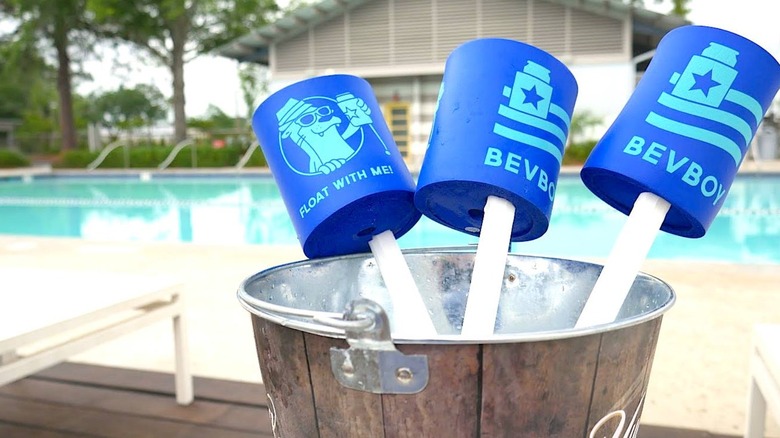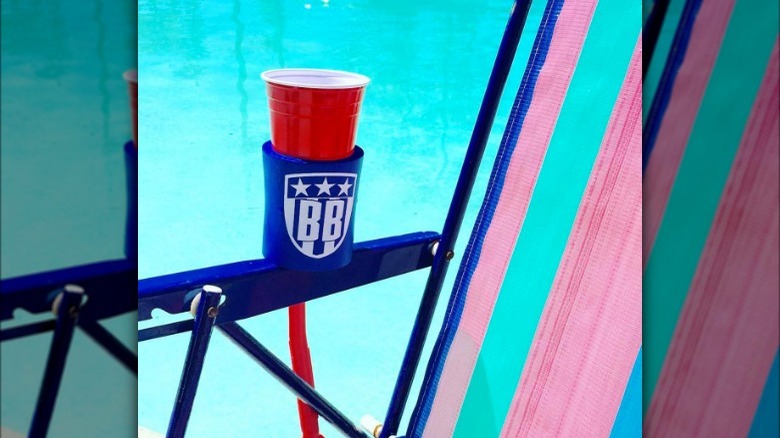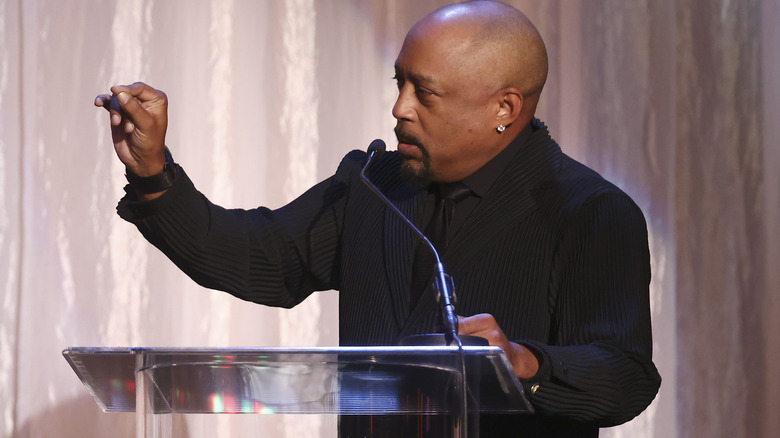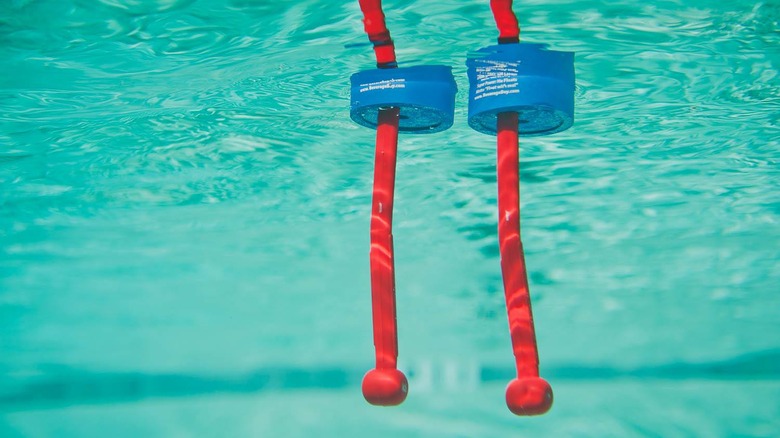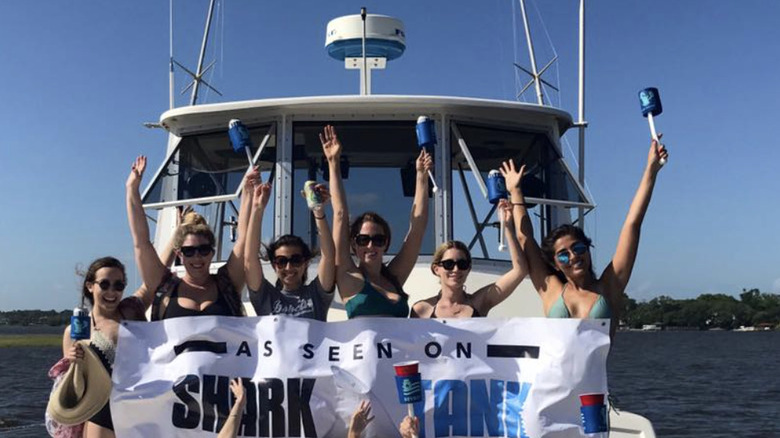BevBoy: Here's What Happened After Shark Tank
Who wouldn't be intimidated by appearing on a wildly popular TV show and pitching your self-made product to some of the most renowned movers and shakers in the world? That's exactly what happened when Kevin Waltermire stepped onto the set of "Shark Tank" with a humble — yet cleverly designed — drink holder, pitching to the likes of billionaire Mark Cuban, the "Queen of QVC" Lori Greiner, venture capitalist Kevin O'Leary, and fashion and branding expert Daymond John. It was 2015, Season Six, Episode 15 of ABC's hit show, and Waltermire faced down the "sharks" with a floating beverage cup, a simulated hot-tub prop, a male model, and a whole lot of hope.
Waltermire is the creator of the South Carolina-based BevBoy company and its star product bearing the same name, affectionately known as simply BevBoy. The idea for the product, which came to life using funds from Waltermire's personal savings account, arose from a common annoyance in water activities — how to stay hydrated while in the hot tub or swimming pool, without spilling your drink. The solution: the BevBoy floating drink holder, which stands out from other "koozie" style floaters by a polypropylene arm extension dangling from the bottom, serving as a stabilizer to prevent the drink from tipping or overflowing.
BevBoy had been trudging along for about two years prior to arriving at "Shark Tank," and potential Shark investors had plenty of questions about its progress and management to date. At least two closely circled the waters, and one dove in, tentatively.
What happened to BevBoy on Shark Tank?
The potential audience for BevBoy ran the gamut from beer-drinking "bros" to sparkling water sippers and soda-slurping kids in backyard inflatable pools — basically anyone bringing a canned beverage on an aquatic fun-day. The pitch on "Shark Tank" included a friend/model lounging in a hot tub, getting sidetracked by a beach ball, and consequently causing his drink to overflow into the water. The amusing presentation and appealing design kept investor attention — until business details brought a harsh spotlight.
Waltermire revealed $10,500 in total revenue before filming the show, with sales of 2,500 units, each costing $2 for production and retailing for $9.99. The judges were reluctant to invest the asking $50,000 for 15% ownership in the company. The final straw for show investors Cuban, O'Leary, and Herjavec came after admission from Waltermire that he failed to bring along order forms to a Promotional Products Show in Chicago. But Greiner and John hung loosely onboard, both eventually making offers.
Greiner started the support offer with the requested $50,000 but with 40% ownership and, crucially, a contingency: Waltermire must prove himself by securing an order from one of the mega big-box retailers at the time: Target, Walmart, or Bed Bath & Beyond. John matched Greiner's offer sans the contingency, noting BevBoy's compatibility with his recent investment in party cups. With a bit more back-and-forth, Waltermire stumbled away with a deal from John for the $50,000, 35% ownership, and no contingency. Sadly, an unexpected turn occurred shortly after.
BevBoy after Shark Tank
It's a bit murky what happened immediately after the show, especially since, according to Waltermire's comments to a local Charleston newspaper, he was unable to start working on his long-awaited deal until his segment on "Shark Tank" actually aired, which in itself wasn't even a sure thing. A handshake deal on the show only begins a long process involving months — or even longer. In the case of BevBoy, the pitch and successful offer did indeed eventually appear on the hit show.
But the glory was short-lived. For reasons undisclosed, the collaboration hit the proverbial "brick wall" of investor funding. The on-air deal failed to finalize, and apparently, no funding from Daymond John materialized after all. No details are apparent on the parting of ways, but John's investments with "Shark Tank" recipients have not always had smooth sailings. News reports in June 2023 revealed a lawsuit and restraining order involving business dealings with Bubba Q's Boneless Baby Back Ribs, whose owners were contestants on "Shark Tank."
Why did BevBoy go out of business?
Despite a seemingly solid offer from Daymond John, a prime-time audience, and a complete product sell-out at the Chicago trade show prior to the "Shark Tank" appearance, BevBoy was unable to move forward after losing the investor funding. Well before the Sharks circled his dreams, Waltermire had pitched the idea on a local level while pursuing an MBA in business at the College of Charleston, but he fell short of gaining support, financial or otherwise, in that exchange. It seems that "Shark Tank" was his last and final hope for taking BevBoy to the next level.
Based on a waning, then nonexistent, online presence, it appears the company stopped operating sometime after 2017. The floating drink holders were still being offered on the official Facebook page around Christmas 2017, but a final post appears to have been in August 2018. A BeverageBoy.com website now features a totally unrelated collection of 50+ templates for letter-writing, birthdays, anniversaries, and similar wishes. The alternatively listed bevboy.com also appears to no longer exist.
What's next for the BevBoy founder?
Though BevBoy seems, on the surface, to have folded, Kevin Waltermire still maintains a strong presence in the world of business — albeit by working for another company. Per LinkedIn, he serves as director of business development for ONE Cannabis Group, a cannabis franchiser in Colorado. His profile page notes a continuing passion for small businesses, entrepreneurship, and giving life to new ideas.
In the same year that Waltermire's "Shark Tank" debut aired, he also founded a startup known as MusicBoxx, which allows users to catalog their life journeys through music videos. There's no news on its development, though the ever-optimistic inventor said in a 2022 audio interview that both MusicBoxx and BevBoy are still in existence, and that "every person has their timing."
He also advised young entrepreneurs to put in a lot of research and be aware that not all great ideas can be implemented in a practical way. And to his younger self, he'd say to be consistent, stay focused, trust the journey, and never doubt your own mind when you know you're doing the right thing.

